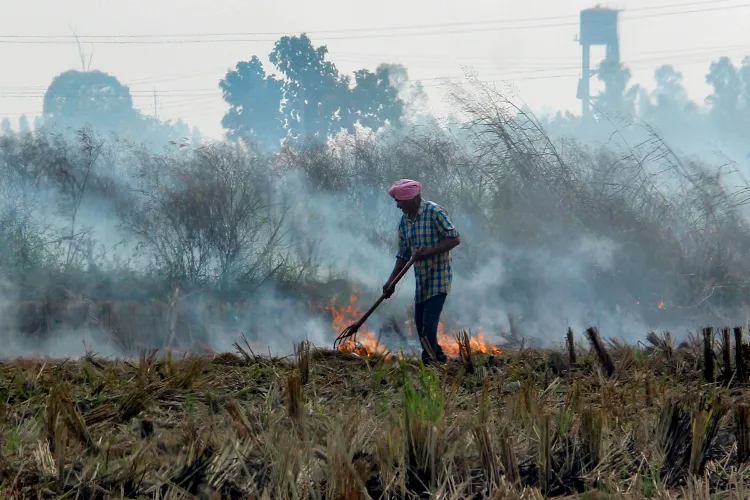
New Delhi
Taking note of stubble burning leading to further worsening of air quality levels in Delhi-NCR, the Supreme Court on Wednesday asked the Punjab and Haryana governments to apprise it about the action taken to control the situation.
A bench comprising Chief Justice BR Gavai and justices K Vinod Chandran and N V Anjaria also agreed to hear the plea on November 17.
"Let Punjab and Haryana governments respond on the steps taken to control stubble burning," the CJI said.
Earlier, the bench had scheduled the matter for hearing on Wednesday. At the outset, senior advocate Gopal Sankarnarayanan said that currently GRAP III is in force.
"Grap IV should be implemented. The AQI (air quality index) has crossed 450 at some places. There is drilling excavation happening outside a court here... That shouldn't happen at least within these premises," the senior lawyer said.
The CJI said that action would be taken in regard to the construction activity.
The Graded Response Action Plan (GRAP) is a framework designed to tackle air pollution in Delhi-NCR region through a tiered system of measures based on the severity of air quality.
On Tuesday, senior advocate Aprajita Singh, who is assisting the bench as an amicus curiae, said that stubble burning has commenced in a big way with impunity in Punjab and Haryana leading to further worsening the air quality levels in Delhi-NCR.
Singh referred to NASA satellite images to buttress her point that the stubble burning in these two states has commenced and it is contributing to already severe air quality in Delhi-NCR.
"The apex court orders are being flouted with impunity," she said, adding that let these states respond to the present situation.
"We will pass some orders on Wednesday," the CJI had said.
Earlier on November 3, the top court directed the Commission for Air Quality Management (CAQM) to file an affidavit detailing the steps it has taken so far to prevent air pollution in Delhi-NCR from deteriorating further.
The bench was hearing the M C Mehta case and had said that the authorities must act proactively and not wait for pollution levels to reach a "severe" stage.
Amicus curiae Singh had flagged media reports indicating that several air quality monitoring stations in Delhi were not functioning during the Diwali period.
"There are newspapers after newspapers saying that monitoring stations are non-functional. If the monitoring stations are not even functioning, we don't even know when to implement GRAP (graded response action plan)... Out of 37 monitoring stations, only nine were functioning continuously on the day of Diwali," she said.
The amicus urged the bench to ensure that CAQM submits clear data and an action plan.
She said the earlier orders mandated pre-emptive measures, rather than reactive steps, once pollution worsened.
"The CAQM is required to place on record an affidavit as to what steps are proposed to be taken to prevent the pollution from turning severe," the bench said in its order.
The counsel for the CAQM said that the Central Pollution Control Board is responsible for monitoring data.
However, Additional Solicitor General Aishwarya Bhati assured the bench that the agencies concerned will file the required report.
On October 15, the CJI-led bench permitted the sale and bursting of green firecrackers in Delhi-NCR during Diwali with conditions aimed at balancing tradition with environmental and health concerns.
The court had made it clear that use of green crackers will be confined to specific hours on Diwali and a day before. The sale of green crackers was permitted from October 18 to 20.
It had also made clear that the relaxation was only on a "test case basis and it shall be only for the period specified".
Significantly, the bench had said, "The Central Pollution Control Board, in consultation with the State Pollution Control Boards and their respective regional offices within the districts coming under the NCR, shall monitor the air quality index in their respective jurisdictions starting from October 14, till October 25 and file a report before this court, specifying the air quality of each day indicated hereinabove...
READ MORE: Shiraz Khan’s ‘Yes We Can’ empowers the voiceless
"Along with such monitoring, the Regional Offices of the State Pollution Control Boards shall also take samples of sand and water from sites with more density of use for analysis," the bench had said.
